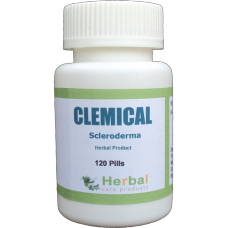Clemical for Scleroderma Treatment
Scleroderma is e medical term used to explain a connective tissue disease that involves changes in the skin, blood vessels, muscles, and internal organs.
Quick Facts
- A disease of connective tissues
- It is a type of autoimmune disorder
- Characterized by a condition that occurs when the immune system mistakenly attacks and destroys healthy body tissue
- Classified into localized scleroderma and systemic sclerosis
- Associated with an overactive immune system
- Characterized by skin induration and congealing escorted by various degrees of tissue fibrosis and chronic inflammatory penetration in numerous visceral organs
- When diffuses all over the body it is also referred to as systemic sclerosis
- Causes spontaneous scarring
- Associated with an overactive immune system
- Women are at higher risk of suffering from Scleroderma than men
- The disease usually affects people 30 to 50 years old
Scleroderma Causes
- Role of certain genes
- Hereditary factors
- Environmental changes
- Activation of the immune system in a susceptible individual
- Injury to tissues
- Buildup of a substance called collagen in the skin and other organs
- Exposure to Silica dust and polyvinyl chloride
- Systemic lupus erythematosus
- Polymyositis
- Mixed connective tissues
Scleroderma Symptoms
- Fingers or toes turning blue or white in response to hot and cold temperatures
- Hair loss
- Hardness of skin
- Abnormally dark or light skin
- Skin thickening, stiffness, and tightness of fingers, hands, and forearm
- Small white lumps beneath the skin, sometimes oozing a white substance that looks like toothpaste
- Sores (ulcers) on the fingertips or toes
- Tight and mask-like skin on the face
- Joint pain
- Numbness and pain in the feet
- Pain, stiffness, and swelling of fingers and joints
- Wrist pain
- Dry cough
- Shortness of breath
- Wheezing
- Bloating after meals
- Constipation
- Diarrhea
- Difficulty swallowing
- Esophageal reflux or heartburn
- Problems controlling stools (fecal incontinence)




